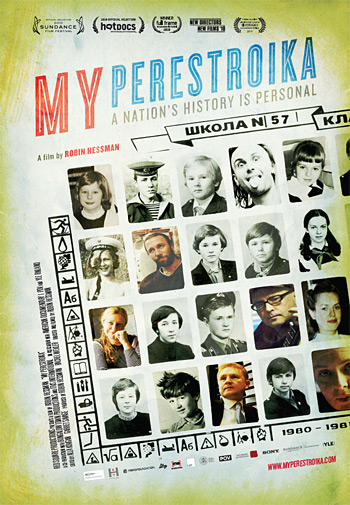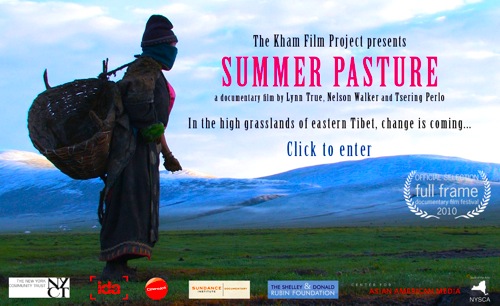By Joe Bendel. Probably no division of the Academy Awards has more byzantine rules than the documentary wing. Their mandated seven day theatrical runs in both New York and Los Angeles can be difficult hurdles for nonfiction filmmakers to clear. However, every selection of the 2010 DocuWeeks will be officially Oscar eligible once they finish their week long runs at the ArcLight and IFC Film Centers. As is seemingly the case with every documentary series, this year’s DocuWeeks is a mixed bag, but two films in particular offer intriguingly intimate glimpses into lives of ordinary individuals living a world away from the arthouse cinema scene.
 Even though he was badly hung-over, he knew there was a national crisis. Though the bleary-eyed Russian did not know at the time the hard-line Communist coup had deposed Mikhail Gorbachev, he saw that Swan Lake was the only program on television. For some reason, the Soviets always broadcasted the Tchaikovsky ballet during periods of internal turmoil. It is telling details like this that connect the personal to the grandly historical in Robin Hessman’s My Perestroika, which screened earlier this year at New Directors/New Films.
Even though he was badly hung-over, he knew there was a national crisis. Though the bleary-eyed Russian did not know at the time the hard-line Communist coup had deposed Mikhail Gorbachev, he saw that Swan Lake was the only program on television. For some reason, the Soviets always broadcasted the Tchaikovsky ballet during periods of internal turmoil. It is telling details like this that connect the personal to the grandly historical in Robin Hessman’s My Perestroika, which screened earlier this year at New Directors/New Films.
A Russophile in high school, Hessman was working for LENFILM, the Soviet film agency based in what was then Leningrad, at the time of the infamous coup. Through her time working and studying in Russia, Hessman developed a keen appreciation for the stoic nobility of average Russian citizens, which is clearly reflected in Perestroika. Using five former classmates as representative everymen, Hessman subjectively presents the last forty-some years of Russian and Soviet history through their reminiscences and home movies.
Yes, there is a certain nostalgia for their childhood years lived under the yoke of Soviet tyranny. However, they are really wistful for their lost innocence rather than the supposed virtues of the Brezhnev era. As becomes clear in their interviews, as the Perestroika generation came of age, it also became quickly disillusioned.
Still, not all of the film’s lead voices are doing badly. An entrepreneur with a small chain of high-end men’s clothing stores, Andrei has done quite well for himself. He is also the most vocal critic of the current Putin regime. While none of the five have led exceptional lives, Hessman had the good fortune to find participants who had been somewhat in the vicinity of great events. Indeed, the experiences of Perestroika’s subjects defy easy classification, at various times lending credence to wide array of political interpretations (though it is hard to find much in the film to justify any faith in Putin’s puppet government).
—
Tibet is also changing drastically, which is exactly what China wants. For instance, it has become increasingly difficult for Tibetans not fluent in Chinese to conduct business transactions. Such are the challenges facing a young nomadic family in Tibet’s eastern Kham region as presented in Summer Pastures, an intimate new documentary from Lynn True and Nelson Walker (with co-director Tsering Perlo), also currently screening as part of DocuWeeks LA.
In many ways, Locho and Yama are much like any other parents you would find anywhere else on Earth. Their greatest hope is for their daughter to have greater opportunities in her life than have been available for them. However, their daily chores are far removed from those western audiences will be familiar with, including the daily spreading and drying of manure for fuel that starts Yama’s daily routine. It is a hardscrabble life, but it is what they have always known.
 Unfortunately, it is not clear whether the nomads’ way of life will be sustainable much longer. Inflation constantly drives up the price of their supplies, while they seem to have less to show for their labors. Adding further uncertainty, Yama suffers from a persistent heart ailment, yet she keeps working like an ox – in contrast to Locho, who often seems like an overgrown kid herding their livestock.
Unfortunately, it is not clear whether the nomads’ way of life will be sustainable much longer. Inflation constantly drives up the price of their supplies, while they seem to have less to show for their labors. Adding further uncertainty, Yama suffers from a persistent heart ailment, yet she keeps working like an ox – in contrast to Locho, who often seems like an overgrown kid herding their livestock.
Even in their remote corner of Tibet, Locho and Yama feel the impact of great macro forces. However, True and Walker focus their sites on their deeply personal family drama, (somewhat timidly avoiding the occupying Chinese elephant in the room). Yet by conveying such a strong sense of the nomadic couple’s personalities and relationship dynamics, Pasture will have most viewers rooting for this family as the film unfolds.
Pasture forgoes filmmaker commentary, instead capturing the nomads’ lives unfiltered, in a style not incompatible with that of Digital Generation Chinese independent filmmakers. Though it requires some patience, it is certainly rewarding to meet Yama and Locho, whose spirit and resiliency the filmmakers capture quite vividly. Both Pasture and Perestroika are difficult films to pigeon hole, but they have more merit than most docs released this year. They are currently screening in Los Angeles, as DocuWeeks continues at the ArcLight.
Posted on August 9th, 2010 at 9:32am.
I love indie films like this. These are people whose voices would never be heard if filmmakers didn’t go and film them. It’s so cool that you cover them. These docus are a window into a different world.
I hope the trailer for the first film is intended ironically. It’s frightening how those young children were brainwashed into thinking that their “beautiful Soviet reality” was so great. All they were fed was a steady diet of state propaganda about the outside world, and they just accepted it. Didn’t these young people question why they were not allowed to travel freely out of their own country, or why at their big parades they dragged by one huge bomb and missile after another while blabbering words about peace? If the Soviets were so peaceful, why did the majority of their budget go toward the military and toward sending their own people to gulags?
The poor Tibetan people. They have been through so much at the hands of the Chinese, while the world just watches and does nothing.
Also to Trojan Horse – I agree that it was creepy to watch all those little Soviet kids being marched around like little clones and brainwashed into saying that state propaganda. I hope they realize now how used they were by that system.
Gorbachev always got too much credit for “Perestroika.” It was going to happen without him or not. He’s been very clever at grabbing historical credit for something he was forced to accept.
Gorbo currently has an office at The Presidio, in San Francisco. That’s America, for you.
It is wicked what the Communist Chinese are doing to the Tibetans. The Tibetans are a peaceful people and do not deserve the cultural and social genocide that is going on against them. I don’t know if I can handle watching this documentary. I would probably cry the whole way through thinking of what has been done to the Tibetans. They deserve to be protected. They are in so many ways the spiritual heart of Asia, and just as America does its utmost to protect Israel, we need to be doing a lot more to protect Tibet. It’s horrible that we are so economically indebted to the Chinese that we cannot openly speak out about their many human rights abuses or do anything about the Tibet situation. Pretty soon, if the Chinese have their way and continue transplanting Chinese settlers into Tibet and continue discriminating against the Tibetans, there will be no Tibetans left at all, and a great cultural and religious tradition will be lost.